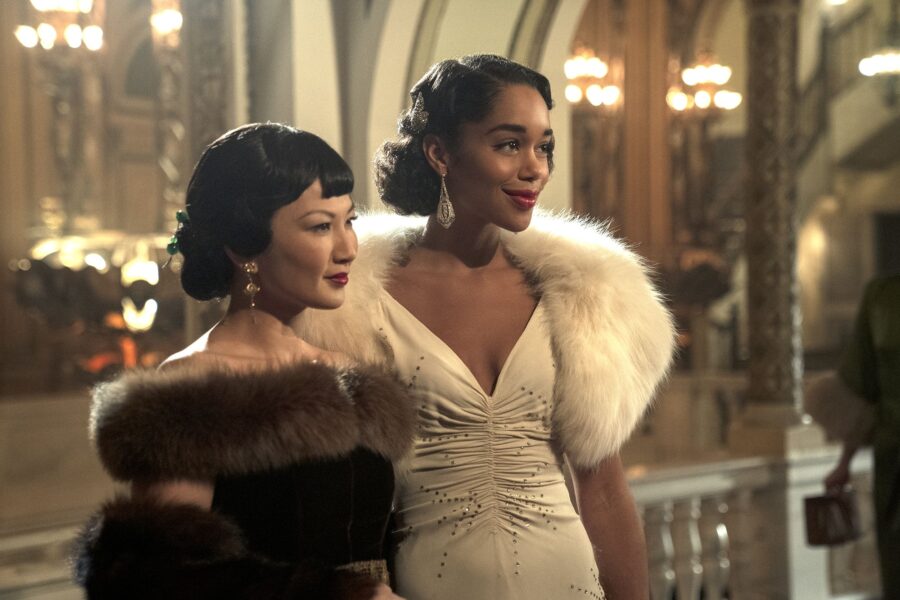This guest post is authored by Tejaswi SJ Rao
***
Hollywood, an American miniseries created by Ryan Murphy (American Crime Story, 9-1-1, Glee) and Ian Brenner (Glee), is now streaming on Netflix. The show is set in post-WW II America, and explores the intricacies, politics and the emotions behind Hollywoodland, now called Hollywood, and the issues faced when movies transitioned from ‘silents’ to ‘talkies’. The show also explores homophobia and racism (two themes prevalent in Ryan Murphy’s other works), and anti-Semetism.
This show could also be seen as a prequel of sorts to Quentin Tarantino’s Once Upon a Time…in Hollywood, and this show shares a lot of similarities with the movie. Even though it doesn’t have just one main character, David Corenswet’s Jack Castello is a mixture of a lot of actors active during the Classical Age of Hollywood, much like Rick Dalton in Once Upon A Time…, who is a mixture of a lot of actors active during the Golden Age of Hollywood. This show, too, is set in an alternate reality, and is based on the idea of what Hollywood could have been, had it overcome the barriers of race, gender and sexuality earlier than when it actually happened. While the conclusion of Once Upon a Time…, results in Sharon Tate not getting killed, in Hollywood, ‘Meg’ wins the Oscar for Best Picture in 1948 and Camille becomes the first ‘black’ person to win an Academy Award for Best Actress in 1948 (when, in reality, it was Halle Berry in 2001 for her role as Leticia Musgrove in Monster’s Ball).
The show’s central plot revolves around the production of a movie called Peg, a film about the suicide of Peg Entwistle a 24-year-old actress who jumped off the ‘H’ of the Hollywoodland sign in 1932. This later changes into Meg, a movie about a girl of colour who is about to commit suicide, but doesn’t and pursues the Hollywood dream. The show also explores the power dynamics that play a part in the green-lighting of a movie.
The show has an enviable ensemble cast. Most of the characters are fictional, excluding a few who are fictionalised versions of real people. There are a lot of references to events that took place during that time, and a lot of stories (part fictional) about the lives of real-life personalities. Ernie, an old actor who now runs a prostitution ring, say his job is similar to what Louis B Mayer does (Louis was the Harvey Weinstein of the Classic Age), and one of his clients is Cole Porter, a famous composer.
Hollywood also gives us a peek into society then. When Jack wears a police officer’s uniform, he is allowed to enter the cinema for free. In the finale, when Camille gets nominated for the Academy Award, she is told to sit separately, because she is a woman of colour. The show hits you hard with these moments, especially when Queen Latifah’s character Hattie (Hattie McDaniel was the first African-American to be nominated and win an award in 1939 for her portrayal of Mammy in Gone with the Wind) says that she wasn’t even allowed to enter the hotel even though she was nominated for an Oscar, and how they made her stand outside and told her to enter, collect the award and leave the premises instantly. Or, when Jeremy Pope’s character, Archie Coleman, is told his name will be removed from the credits as screenwriter because he is a man of colour.
From the second episode, the title sequence shows the main cast climbing the Hollywood sign and gazing at the city. A few actors lose their grip, and the other actors catch them and help them climb forward. This scene is a wonderful symbolism for the rise and fall of an actor’s career in Hollywood.
Another fact that this show tells us is how managers, agents, and producers used the ‘casting couch’ and how it has been that way for a long time (Jim Parsons’ Henry Wilson fellates Jake Picking’s Roy Fitzgerald under a veiled threat of not being his agent if he refuses). The show also tells us how many people in the industry had to stay “hidden”, lest they get fired. The show gives us a really deep understanding of the troubles faced by homosexuals in the industry.
Recommended
Henry Wilson’s character in the show has a complete arc. In the beginning, he is shown as a rude person and an abuser who exploits actors (both gay and straight), and by the finale, he has changed to be a much better person who wants to work for the recognition of homosexuals in the industry. He has a scene where he breaks down while talking about Trent “Junior” Durkin (his real-life lover who died in a car crash) and says that was the closest he had ever come to feeling love, and tells Rock Hudson (Henry changes Roy’s name to Rock because it’s more suitable for a movie star) that he feels the same love for him. “You’re my passion, Rock Hudson. I’ll kill for you, kid, and I ain’t foolin’. I’m gonna make you the biggest star in the world”. Not many sitcom actors get to lose the identity they have been associated with for a long time and move on immediately, but Jim Parsons is lucky that way. You can see some eccentricities of Sheldon Lee Cooper in Henry, but Henry is a more nuanced role.
Hollywood is a good show to watch if you are interested in the making of one of the biggest industries in the world, and the factors that play a role in its functioning. It is filled with references to the Classic Age, and if you are a fan of that era (like me), you’ll thoroughly enjoy it.



